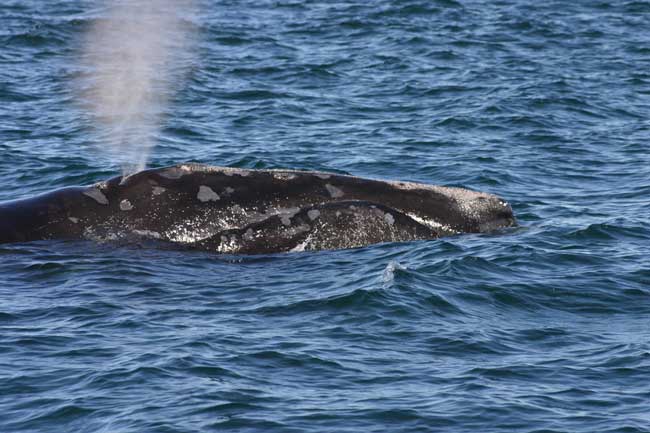Mystery 'Gunshot' Sounds Are Whale Threats

North Atlantic right whales sometimes make a loud gunshot-like noise for what have been mysterious reasons up until now.
A new study suggests the call, which seems to come just from males, could serve as a threat to male competitors, or as an advertisement to females.
“It is an intense sound,” said researcher Susan Parks of Penn State University. “It was labeled ‘gunshot’ because it really just sounds like a rifle being shot — sharp, with reverberations.”
Parks and colleagues recently conducted the first formal study of this sound in North Atlantic right whales. The researchers placed five sound recorders underwater for two weeks in Canada’s Bay of Fundy, where groups of the whales spend the summer feeding. The scientists recorded every instance of the gunshot noise, and made observations of the whales’ behavior during the same period.
“We were trying to eavesdrop for two weeks to see how many whales are making this sound,” Parks told LiveScience. The researchers wanted to document when and how often the gunshot noise was made, and by which whales.
The team found that the sounds came either from lone males, or from mixed-sex groups of whales gathered at the surface.
Most likely, the scientists concluded, the noise was being used by males to warn off competing males, or to lure in females.
Get the world’s most fascinating discoveries delivered straight to your inbox.
“We’re still really at the beginning in terms of figuring out what this sound is for,” Parks said. “It’s very possible that it serves both purposes.”
The next step toward tracking down the answer is gathering more data. That prospect is made difficult, however, by the fact that North Atlantic right whales are endangered, and only 300 individuals are left in the wild. Tracking them down and catching them making the noise can take a while.
The dark grey whales often weigh up to 70 tons (63,500 kilograms) and are about one and a half times the length of a school bus. Named right whales because they were a favorite species of whalers (they were the “right” ones to hunt), the mammals now face their biggest threat from the shipping industry. Studies have found that more than half of North Atlantic right whale deaths are caused by collisions with ships.
While whales have been well-studied for some time, there are many lingering mysteries about these ocean giants.
"There are some species of whales where we don’t even know what sounds they make,” Parks said. "It’s really quite remarkable that new sounds are being discovered. We’re really just scratching the surface of the sounds they make and how they use them."
Parks will present the team’s findings Nov. 11 at the Acoustical Society of America’s annual meeting in Miami, Fla.
- 10 Species You Can Kiss Goodbye
- Images: Endangered and Threatened Wildlife
- Gallery: Under the Sea -- Life in the Sanctuaries
 Live Science Plus
Live Science Plus






